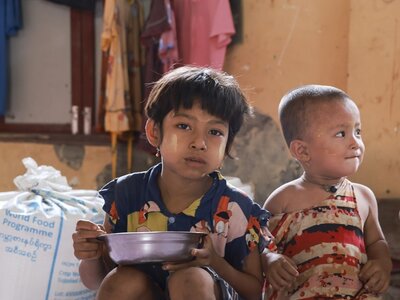Emergency
Myanmar
- 850,000
- people targeted for WFP support following earthquake
- US$40 million
- needed for the emergency response
- 15.2 million
- people were already food insecure prior to earthquake (over 1 in 4 of population)
A 7.7-magnitude earthquake struck central Myanmar on 28 March 2025, killing more than 3,500 people, destroying infrastructure and reverberating through neighbouring countries.
The World Food Programme (WFP) has reached over 180,000 survivors in Mandalay, Naypyitaw, Sagaing and Shan, and is scaling up efforts to assist 850,000 people in total.
We have established a central response hub in Nay Pyi Taw and are working with partners on rapid needs assessments in Mandalay, Sagaing, Shan and Nay Pyi Taw, while also evaluating market access and functionality.
However, access and telecommunications issues are hindering a full-scale response to the massive needs.
WFP urgently needs US$40 million for the earthquake response,
Myanmar was already facing the worst humanitarian crisis in its recent history, affecting 15.2 million people.
A political crisis, conflict, economic downturn, pre-existing poverty and climate-related shocks are all driving the hunger emergency.
Conflict is spreading into new areas, driving displacement at a record scale. Most displaced people are cut off from access to food and often dependent on WFP assistance for survival.
Myanmar is highly vulnerable to climate-related disasters. Devastating floods in September 2024, caused by Super Typhoon Yagi, have affected more than 1 million people.
What the World Food Programme is doing to respond to the Myanmar emergency
-
Emergency response
-
WFP has dispatched more than 100 metric tons of food from Yangon to Mandalay, Nay Pyi Taw, and Sagaing following the devastating earthquake. We have over 200 metric tons of fortified biscuits available for immediate distribution, with an additional 7,000 metric tons of food stocks in-country to assist those hardest hit. WFP further ensures that life-saving assistance reaches communities affected by conflict. Following breakthroughs over the past two years in accessing hard-to-reach locations, WFP has launched emergency food and nutrition programmes in Kayah State, southern Shan State, Bago Region and Sagaing Region for thousands of people.
-
Nutrition
-
WFP provides a comprehensive package of nutrition support to pregnant and breastfeeding women and young children aged between 6 months and 5 years. WFP also provides food and cash-based nutrition support to people living with HIV and TB, and delivers nutrition education and counselling.
-
Resilience
-
In areas with relative stability, WFP is creating livelihood opportunities and improving resilience through projects for the development of community assets such as roads, terrace land, irrigation canals, flood-protection dykes and home gardens.




